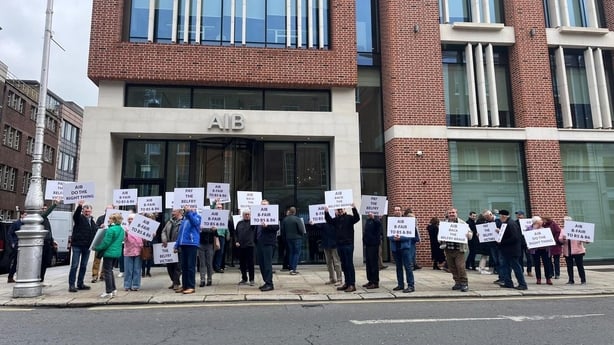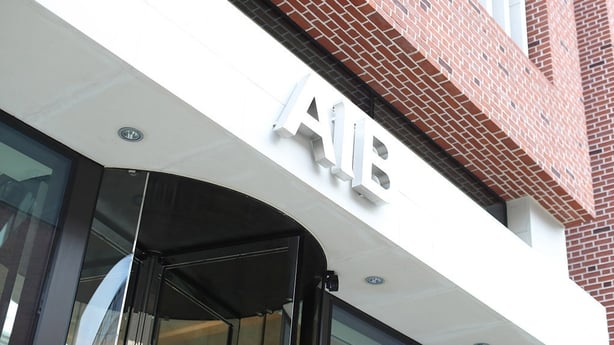The exchequer is set to receive a €1bn boost after shareholders at AIB backed a plan to buy back another big tranche of its shares held by the State.
The poll was taken at an extraordinary general meeting (EGM) this morning and results published this evening show it was backed by 100% of shareholders who voted.
The move will result in the State's holding in the bank falling from around 38% to just under 33%.
Speaking following the EGM, AIB’s CEO declined to speculate on when the State’s shareholding might reduce further.
"The timing for any future share disposals is entirely a matter for the Minister for Finance," said CEO Colin Hunt.
"Our job at AIB is to ensure that if and when he chooses to transact further, that there is a strong investment proposition."
A short time before the EGM, at the company’s annual general meeting (AGM), shareholders also voted in favour of a plan that would see the lender offer to buy back the shares of small shareholders who own 20 shares or less at a premium of 5% above the market price.
The proposal is aimed at providing an incentivised mechanism for shareholders with very small holdings to dispose of their shares without incurring costs.
It follows a request from shareholders for such an "odd lot" offer because when dealing costs are factored in it is not worth their while selling the shares.
Following the bailout of AIB during the financial crisis its share register has an unusually large number of small shareholders who make up 89% of its base, but hold just 0.01% of shares.
A wide range of issues were raised by shareholders during the AGM, including the treatment of EBS tied agents, tracker mortgage customers and investors in the failed Belfry Funds.
While the meeting was taking place a group of up to 50 people who had invested in the failed Belfry scheme that was marketed and sold by AIB protested outside.
Between 2002 and 2006, 2,500 people put £214m into the ill-fated Belfry Funds, which invested in UK commercial property.
Belfry Investment Fund 1 made a return of around 250% but the following five funds were caught up in the subsequent financial crisis and property downturn and the losses they incurred resulted in investors' money being wiped out.
While investors in Belfry Funds 2-4 have been refunded their money following a case-by-case review by AIB in recent years, only some of the investors in Belfry Funds 5 and 6 have been either partially or fully compensated.

Ken Hannigan from Mornington in Co Meath was among those protesting.
He claims he invested €100,000 in Belfry 5 after he was convinced to do so by an AIB employee, but by 2013 he had been told that all the money had been lost.
Since then, he says he has been fighting to try to get his money back, but so far has been unsuccessful in doing so, despite taking part in the bank organised review.
"It is not a fair system," he claimed.
"That was our pension, that was money that was going for my two sons’ education," he said.
"I wouldn’t have gone into a high-risk fund."
Also protesting was Edward Sheehan from Fermoy in Cork, who is a former chair of the Belfry Action Group.
Following court action with the group, he did eventually get a refund of the €150,000 he was loaned in 2004 by AIB to invest in Belfry Fund 4, but which was subsequently lost when the fund failed.
But he says those who haven’t been compensated by the bank should be.
"It is a scandal at this stage that AIB will not pay everyone in Belfry 100% plus compensation, in the interests of treating everyone fairly," he said.
"If the people that I know, if they were told it was high-risk, they would not have invested."
But speaking to the media after the AGM, Colin Hunt said for Belfry Funds 5 and 6 it was explicitly called out that these were "high-risk speculative investments".
"That is the position of the Group," Mr Hunt said.
In relation to the current challenges facing the commercial real estate market here, Mr Hunt said rates are expected to come down later in the year and that will bring yields back a bit, supporting the industry.
"But as of today we are very very happy with where we are in terms of provisions and we do expect the market to stabilise after quite significant falls in both office and retail as we move towards the end of the year," he said.
Earlier, AIB said its total income increased by 18% in the first quarter of the year on the back of the higher interest rate environment and after what it called "a very strong first quarter performance".
In an interim management statement the bank said its Net Interest Income was 27% higher in the first quarter of 2024 compared to the same time last year.
This was mainly due to higher interest rates, an increase in average loan volumes and the slower than anticipated pace of deposit migration, it added.
AIB said its full year 2024 NII guidance of over €3.65 billion assumes an ECB deposit rate of 2.75% by the end of the year.
 The
The
The bank's other income decreased 14%, which it said reflected lower income from forward contracts as the majority of Ulster Bank loans have been onboarded. There were also strong performances across fee-based lines.
It also said its operating costs were up 7%, on the back of higher wages and general inflation, the introduction of variable pay and health insurance and higher staff numbers given the enlarged group.
It added that it expects costs for the full year of 2024 to increase by 6-7%.
AIB said that total new lending of €2.8 billion in the first three month of the year was broadly in line with the same time last year.
The bank noted that the Irish mortgage market performed well and its new mortgage lending in Ireland was €0.8 billion, which resulted in a market share of 35.4%.
Meanwhile, green lending in the first quarter accounted for 34% of new lending with €12.5 billion of new green lending since 2019.
The lender also said its asset quality remains "resilient".
"However we are ever vigilant with careful management of the loan book as we monitor the impact of inflation and higher interest rates," it said, adding that non-performing loans came to €2.1 billion or 3% of gross loans, up slightly from €2 billion at the end of December.
Colin Hunt said that with continued momentum across the business and the embedding of its strategic priorities, it is confident in the outlook for 2024.
"AIB continues to be in a position of strength with a robust balance sheet, stable deposit base and growing loan book enabling us to support our customers and the wider economy," the CEO said.
"We are well on track to deliver sustainable returns for our shareholders guided by our medium-term target of a RoTE of 15%," he added.
The bank said asset quality remains resilient but it recorded a small net credit impairment charge in the first three months of the year.
It also put aside around €100m during the period as an early recognition of the revised bank levy.
"We expect bank levies and regulatory fees for full year 2024 to be c. €145m," it said.
The bank's shares moved higher in Dublin trade today.
- additional reporting by Glenda Sheridan







